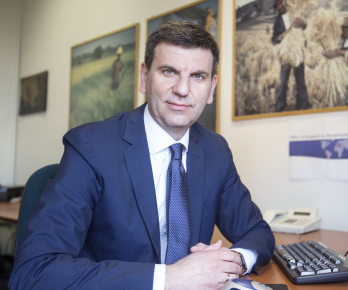Food Systems Podcast 67
In discussion with Viorel Gutu
Monday, Apr 07, 2025
As the FAO celebrates its 80th anniversary, we speak with Viorel Gutu, Regional Representative for Europe and Central Asia, who took part in our Annual Conference on April 1. We discuss the resilience of agri-food systems in the face of conflict and climate change, the impact of the FAO, and how stronger public-private cooperation can help address the challenges.

Here is a summary of the conversation.
Today’s challenges range from geopolitical conflicts to a changing climate. How resilient is the agri-food system in being able to respond to them?
Agri-food systems are under growing pressure: extreme weather, soil degradation, biodiversity loss. FAO is working with governments and the private sector to answer the challenges, but they will not be solved without concrete actions.
FAO works with partners, with governments, to bring the dialogue to field level and how technologies and innovations can be implemented. We try to get this high on the agenda. Agriculture and food are becoming more and more important, demand for food is growing and we forecast a decrease in agricultural production in the next year. We have to be forward-looking, future-looking.
How can the public and private sectors work together better in responding to those challenges – bringing forward innovation, building resilience in the food system?
The public sector has a specific role: legislation, policy, creating incentives to support agricultural production. The decisions are with the private sector: what to produce, where to channel the investments, how to implement in the field. The private sector are the leaders. Governments don’t have mechanisms to do this, but we do have ways to influence the decisions of the private sector.
One example is the implementation of conservation agriculture and no-till technology. Governments were sceptical, but the private sector led the process. Governments learned from them about the benefits for soil, for water, and then governments brought in research institutes and science. We convinced the politicians and the research community by using the private sector as advocates for new technologies.
Views differ about whether the private sector should deliver the solutions and government should retreat, or public policy should deliver change. But is it a combination of public and private sectors working better together?
Absolutely. Food safety is one example. The private sector is responsible for producing safe food. Governments are responsible for ensuring there is a certain level of regulation and that it is being implemented. It is a partnership. Another example is prices: cash is a big issue for small farmers who are vulnerable. There has to be consideration of the price paid to farmers. There is a role for government to ensure the dialogue takes place.
How does FAO see research and innovation helping solve the challenges? How do we make sure innovative solutions reach small scale farmers?
Research and innovation is crucial: we have to base solutions, policies and actions on science. FAO is creating platforms to share knowledge and expertise that exist in one part of the world with other places where it is needed. We can bring this knowledge to small scale farmers by creating communication platforms and by education, so we have to invest in educating and improving.
For example, we have a digital regional technical platform on green agriculture which is accessible to everyone. One barrier to knowledge transfer is language, and research can be separated into “bubbles” because of language. With these platforms, FAO is trying to break down the barriers so there is more communication, be it on seeds, technologies, forestry, fisheries, or protection of natural resources.
FAO is in its 80th year, and you’ve emphasized how it plays a catalytic role. How would you assess its impact, and the role it will continue to play in building agri-food systems?
FAO was created in 1945 as a response to global hunger, and the mandate has grown. We have created communication platforms, and set up the World Food Programme. FAO has built a database containing data on many types of activities, and this data is used in making decisions for forward-looking policies. We also have a database of publications. Another achievement is our investment in education, which has trained half a million people from policymaking to private sector, research and academia.
All of this has contributed to national or international policies, and FAO has achieved its scope. More than that, it has created a good basis for governments to cooperate and for the work of the future.

Viorel Gutu
Viorel Gutu has 30 years of experience in agricultural development, enterprise restructuring, structural reforms and private business...see more
A national of the Republic of Moldova, Viorel Gutu was appointed to the post of FAO Assistant Director-General and Regional Representative for Europe and Central Asia in February 2024. Prior to that he served as FAO Subregional Coordinator for Central Asia and Representative for Türkiye and Uzbekistan.
He joined FAO in 2014 as the head of the FAO Tajikistan office, leading the Country Office in establishing productive relations with the national government and key donors.
Before joining FAO, Gutu was Deputy Minister of Agriculture and Food Industry in the Republic of Moldova. In this position, he was responsible for the coordination, monitoring and evaluation of strategic policy implementation in agriculture and rural development. He also served as an economic affairs officer with the United Nations Transitional Administration in Timor-Leste, where he dealt with peacekeeping operations, poverty alleviation and the prevention of emergency situations. He holds a doctoral degree in economics.
